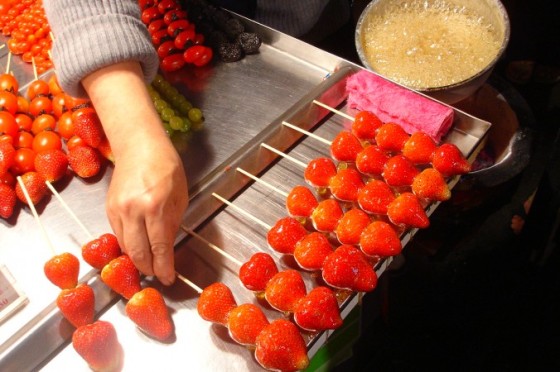By Chao Yu
A Facebook friend of mine who currently lives in Taiwan posted on her page that she went back to Beijing and purchased “Big Shrimp Crunchy Candy”, or da zia su (a type of crunchy sweet). She called it “flavors of home.” I took a look and found it to be quite similar to the kind of candies I wrapped while in prison. It was wrapped quite sloppily, too.
The prison got work consignments from candy companies, and then forced the prisoners to wrap candies. Those candies were really dirty. We wrapped them right in the cells. The amount of candies we had to wrap each day was extreme. Many people had their entire fingernails fall off while trying to meet the quota, because when you press on the candies tens of thousands of times, the nails would separate from the fingernail bed, turn black, then fall off. The pain was excruciating.
Holding great resentment inside, the prisoners hated the police, hated the candy factories, and hated the end-customers. They would smear dirt, body fluids, and even semen onto the candies. The name of the candies we wrapped was Lao Bu Te, a famous Beijing brand respected for being an “organic product.”
Cakes often come with paper baking cups that are ruffled, with cakes inside. This type of baking cup is also produced in prisons, and is made using toxic glue. My former classmate Wang Weiyu, also unjustly incarcerated for his peaceful beliefs, was forced to make these baking cups for many years.
There is a well-known mooncake brand in China, the name of which I forget (their package often has the image of a pair of fish on it). The hard paper bags of the brand are also made in jail. The hard paper needs to be molded into shapes. In order for the shapes to stay in place, the paper bags were stacked up by the dozen, and the prisoners then had to bounce up and down on top of them. They bounced like this late into the night. Sleep was permitted only after finishing the quota. My wife, Zhu Tong, made paper bags for this well-known mooncake brand when she was incarcerated.
The air-dried chopped onions inside the vegetable bag that comes with instant noodles are made of onions that are selected to be slightly bigger than your thumb, and that cannot be sold in stores. I graduated from the prestigious Tsinghua University, and at least four other Tsinghua alumni were in the same prison as me. My former classmate Meng Jun and I, together with near-70-year-old Li Chang and a few dozen other people, were forced to stand in a row in the biting cold wind and peel off the rotten and stinky skins of the onions. The remainder of the onions were then manufactured and swallowed by customers as “vegetables.”
For many years, the Chinese authorities paid prison guards practically no salary. If they wanted to provide for their families, purchase clothes for their wives, support their kids through school, or buy their children some extra milk as they grow up, all these expenses were paid for by enslaving the prison inmates. The guards’ wages have increased in recent years, though. But can you ever have too much money? They therefore still use prisoners as slaves.
I spoke to one prisoner who had been incarcerated many times. He told me that in Xinjiang Province, prisoners smashed their own legs with rocks to escape the labor. They also had to make it appear like they got injured while working, since “faking illness to evade work” was severely punished.
There was one time when an inmate was isolated after contracting hepatitis. Other prisoners would pass their requests to him through people they knew, wishing to obtain some of his urine with the hope that they too could be infected with hepatitis. The prisoner with hepatitis would only choose his best buddy to offer him the urine, as the person who wanted to get sick, as well as the sick prisoner himself, would be severely punished if the deed was discovered.
You can’t give the urine to someone in a lunch box, since it is sure to be inspected by experienced prison guards. Therefore, you need to get a towel to soak up the precious, highly infectious urine from the hepatitis carrier. The towel was passed to his friend, who sucked on this towel with all his strength in the freezing cold.
The cruelty of slave labor was such that prisoners would break their own legs or drink another person’s infected urine to escape it.
In this cruel and unjust world, you can’t expect to simply live a leisurely life, eating well and worrying about nothing. By getting rid of the Communist Party, we will no longer have to fear that we or later generations are eating crunchy candies smeared with the bodily fluids of prisoners.
Chao Yu is a graduate of China’s prestigious Tsinghua University. In 1999, after the communist regime began its campaign against the Falun Gong spiritual practice, he assisted foreign correspondents to develop secure communication channels, evade the authorities, and conduct interviews with Falun Gong adherents who had suffered persecution. Because of his activities, Yu, his family, and friends have been given long sentences and spent years in jail.
Translated by Cora Yu. Edited by James Poulter and Leo Timm.
Views expressed in this article are the opinions of the author(s) and do not necessarily reflect the views of Epoch Times.
Source – http://www.theepochtimes.com/n3/2246378-candies-wrapped-in-the-bitterness-of-chinese-forced-labor/
—————————————

